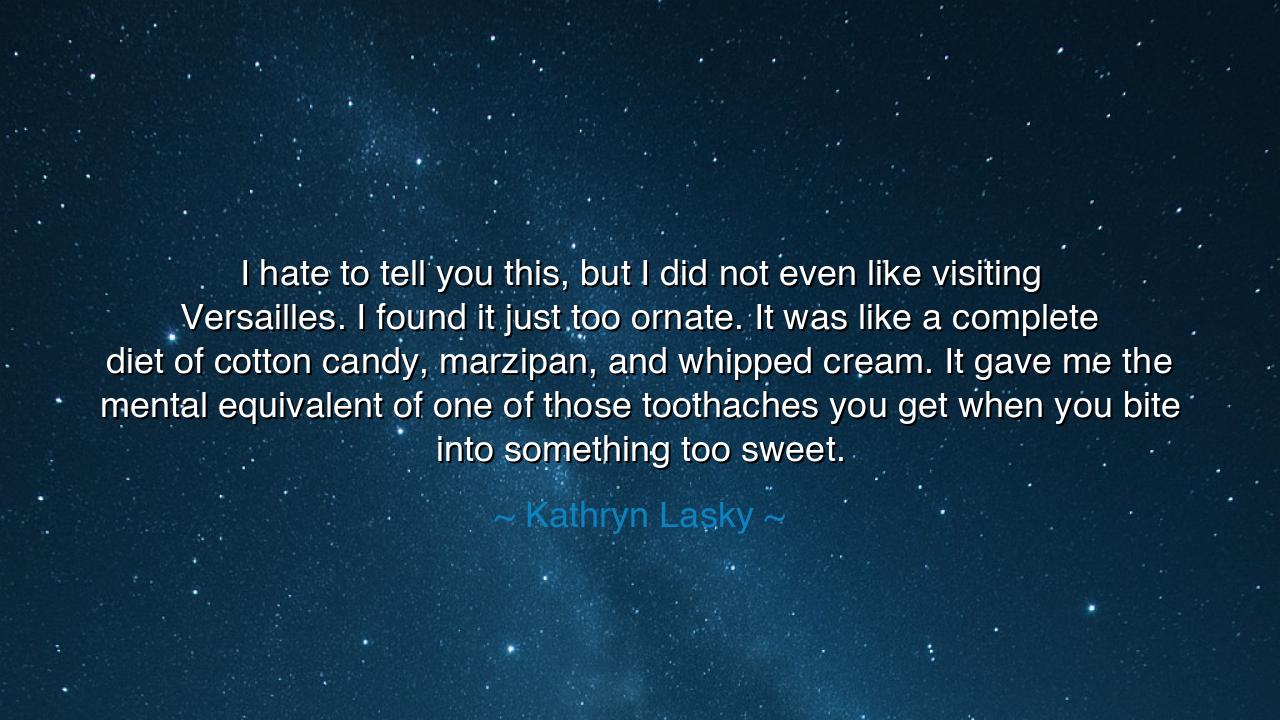
I hate to tell you this, but I did not even like visiting
I hate to tell you this, but I did not even like visiting Versailles. I found it just too ornate. It was like a complete diet of cotton candy, marzipan, and whipped cream. It gave me the mental equivalent of one of those toothaches you get when you bite into something too sweet.






Harken, O children of wisdom, to the words of Kathryn Lasky, who once spoke thus: "I hate to tell you this, but I did not even like visiting Versailles. I found it just too ornate. It was like a complete diet of cotton candy, marzipan, and whipped cream. It gave me the mental equivalent of one of those toothaches you get when you bite into something too sweet." These words, spoken in a time of overindulgence and excess, carry a depth that calls to us through the ages, urging us to reflect on the balance of life, of beauty, and of the true nature of pleasure.
What does it mean to stand in the midst of opulence, to be surrounded by gilded mirrors and shimmering tapestries, to witness the ornateness of a palace such as Versailles? It is a place where the extravagant is the norm, where every inch of space, every stone in the walls, cries out with excess. And yet, here, Lasky, with her sharp eyes and discerning soul, felt the sting of disillusionment. For what is it to feast upon sweetness that overwhelms the senses, that drowns the very essence of enjoyment? She likens the experience to a diet of cotton candy, marzipan, and whipped cream—all light, all sweet, and yet, in the end, empty and fleeting. It is the kind of indulgence that, once savored, leaves nothing but a dull ache behind.
Consider the example of the great Alexander the Great, whose conquests were marked not by the pursuit of mere luxury, but by the cultivation of a grand vision. Yes, he was surrounded by treasures, but he knew the true weight of power was not in riches or extravagance. His army, though they conquered kingdoms, never lost sight of their purpose. They knew that indulgence, if left unchecked, would erode the strength of their resolve. Alexander understood that a kingdom built on pleasure alone would falter. And so, while Versailles may stand as a symbol of power and wealth, its allure is fleeting. It is the weight of substance, of something deeper, that endures.
In the wisdom of Lasky’s words, we find a powerful lesson: beauty is not to be found in excess, nor in the constant pursuit of the superficial. True beauty, like true strength, is tempered, measured, and rooted in a sense of purpose. The ornate and the extravagant can overwhelm us, just as an overabundance of sweetness can lead to a bitter aftertaste. The experience of too much beauty—too much luxury—can numb the senses and dull the mind, much like the biting pain of a toothache that follows a too-sweet indulgence. It is a call to seek balance, to find moderation even in the most dazzling of surroundings.
Think of the great philosopher Socrates, who shunned the luxuries of his time, instead seeking wisdom in simplicity. He was no stranger to wealth or power, but he knew that true fulfillment came not from the world’s excess, but from the cultivation of the mind and the spirit. His life was a testament to the idea that a steady, thoughtful life—one filled with purpose and wisdom—was far more nourishing than a life of indulgence and excess. Just as Lasky saw in Versailles a cacophony of sweetness, so too did Socrates see the distractions of the world, urging us to turn away from them in favor of something more lasting.
Thus, the lesson of Lasky’s words is clear: seek not the overindulgence of fleeting pleasures, for they will leave you hollow. Stand, instead, in the quiet of moderation and substance. Allow your experiences to be rich, but not cloying; beautiful, but not overpowering. When you taste life, savor it, but do not gorge yourself on sweetness alone. Like the wise and discerning Alexander, or the humble Socrates, know that it is the balance of life that grants true joy. To the seeker of wisdom, I say: Let your path be one of clarity and strength, guided not by the lure of excess, but by the quiet and steady voice of true beauty.
Practical steps, O wise ones, are these: In every corner of your life, whether in your food, your possessions, or your relationships, seek balance. Relish the moments of beauty that come your way, but do not drown in them. Pursue the substance of life, rather than its fleeting decorations. And in your heart, let the sweetness of life be tempered by the strength of purpose, so that when the sweetness fades, you are left not with a toothache, but with the quiet satisfaction of a life well-lived.






AAdministratorAdministrator
Welcome, honored guests. Please leave a comment, we will respond soon